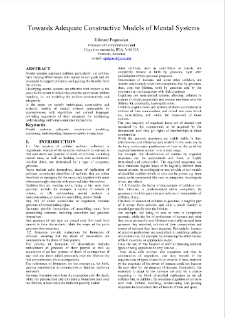Object
Title: Towards Adequate Constructive Models of Mental Systems
Description:
Mental systems represent realities, particularly, our utilities, have varying effectiveness with respect to our goals and are processed to support utilization and gaining the benefits from the utilities. Classifying mental systems are effective with respect to the goals to the extent to which they provide appropriate utilities regularly, i.e. are modeling the utilities constructively and adequately. In the paper we specify ontological, constructive and systemic models of mental systems comparable by expressiveness with algorithms and natural languages providing arguments of their adequacy for explaining, understanding and human-computer interactions.
Abstract:
Mental systems represent realities, particularly, our utilities, have varying effectiveness with respect to our goals and are processed to support utilization and gaining the benefits from the utilities. Classifying mental systems are effective with respect to the goals to the extent to which they provide appropriate utilities regularly, i.e. are modeling the utilities constructively and adequately. In the paper we specify ontological, constructive and systemic models of mental systems comparable by expressiveness with algorithms and natural languages providing arguments of their adequacy for explaining, understanding and human-computer interactions.
Identifier:
oai:noad.sci.am:135793
Language:
URL:
Additional Information:
Affiliation:
Institute for Informatics and Automation Problems ; Division of Computational and Cognitive networks
Country:
Year:
Time period:
Conference title:
11th International Conference on Computer Science and Information Technologies CSIT 2017
Place:
Participation type:
Object collections:
- Digital Library > Academic Insitutions > Insitute for Informatics and Automation Problems of NAS RA > Conferences
Last modified:
Mar 3, 2021
In our library since:
Jul 16, 2020
Number of object content hits:
169
All available object's versions:
https://noad.sci.am/publication/149320
Show description in RDF format:
Show description in OAI-PMH format:
| Edition name | Date |
|---|---|
| Edward Pogossian, Towards Adequate Constructive Models of Mental Systems | Mar 3, 2021 |





